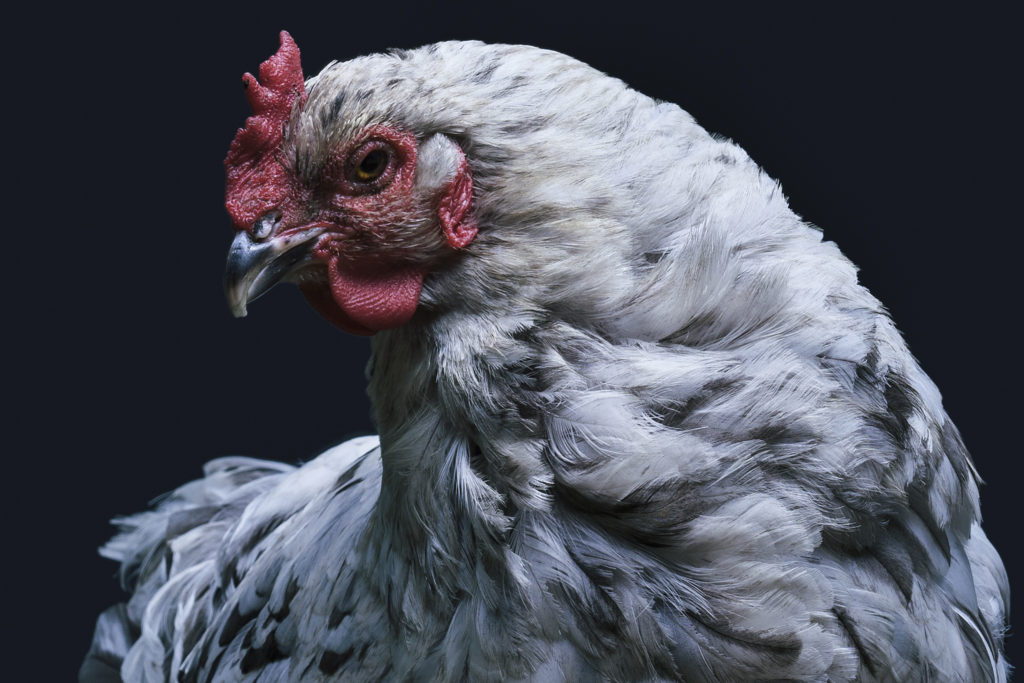Jack’s grandfather could relate to serial killers.
“After you do in the first one,” he said. “The rest are easy.”
The old man unlatched the gate and slipped into the fenced yard, cooing at his prey. The first two he caught easily, one under each arm. Out by the chopping block he passed one of the roosters to Jack. Jack held the struggling bird like a bellows and prayed it wouldn’t wriggle free. He watched his grandfather press a slender head between two nails on the stump and heard the chicken’s shallow hiss. A jewel-like eye twitched. The old man turned to look at Jack.

By John Towner
“Cover his eyes, damn you. There’s no need to make him watch.”
Jack slipped a hand over his bird’s head and the red comb folded under his palm. The struggling stopped. He looked up as the axe came down. Blue-green and iridescent gold, the headless bundle jumped from the altar and skittered around the yard for an unholy amount of time. His grandfather pounced on the frantic body and held it, whispering until the movement stopped. Jack turned back to the head on the stump, eyes closed, a tiny slip of tongue hanging from its beak.
It takes a long time to die, he thought.
“I’ll aim below the voice box next time,” his grandfather said and put the second rooster on the block.
Jack was told to gather the next two, but the birds knew of the butchery and instead of pecking near the gate, they flapped and scattered as he clambered into the pen. One turned back at him with dangerous eyes. He snagged another, body heaving, and clutched it. His grandfather called, “Bring it out, bring it out.” But the nasty one turned on him, wings outstretched. Jack heard his mother on the path to the coop.
“How are you boys doing?” she called out. Jack dropped the bird and scuttled towards the gate.
“You’ve got to toughen up,” Granddad said.
But he didn’t give Jack another chance.
Years later, Jack did some killing of his own. The first time, on a hunting trip with a friend, he fired at a deer, nicked the shoulder and had to shoot again. The body dropped, spasmed, and his buddy had to pull the buck’s head back by its velvety button antlers to slit the throat. Once, at the cabin, his dog got into a nest of grey squirrels. There were six tiny babies, their bodies hairless, like pink fingers with long black nails. His mother told him they were invasive anyway and shoved them into a sack with a few large rocks. She made him take them, mewling, down to the lake.
Then there’d been the mouse in the trap at his first house. He’d been curled around his girlfriend when the snap came. They both heard the thwapping, but neither would get out of bed. In the morning they found the trap on the kitchen floor and a bloody path trickled toward the fridge. A three-legged mouse had stiffened below the shining white door. Jack picked it up with a paper towel and threw the body into the bushes across the road. His grandfather had been wrong, Jack thought. No matter how many lives, he’d gone through, he never found it any easier.
When Grandfather moved to an apartment in the city, Jack had been relieved. Neither he nor his mother had time to return to the farm to put up the firewood or push the mower around the lawn. Jack had a key to the condo and used to let himself in. On Saturday mornings, he’d find the old man jammed into his blue and gold reclining chair, aiming his remote like a detonator at the TV. His breath was short and gasping by then. “How can anyone watch this thing?” he’d said.
*
At 37, Jack found himself in an oncologist’s office and the doctor told him he had a sixty per cent chance of surviving the bone marrow transplant. A week of cell-killing chemotherapy and several zaps of radiation would kick off the lymphoma treatment. She spoke like they were embarking on some great adventure together. “First we’ll destroy your immune system and then we’ll give you a new one.”
The doctor smiled and Jack pictured the first marrow bones he’d ever eaten at a fancy restaurant in Montreal. That was the year he’d tried city living. The two ivory vessels came on a pure white plate. The girl he was dating wouldn’t order the steak tartare or the fattened goose liver pate. She scrunched up her nose and asked for chicken. He’d watched her cut the dry, grilled breast as he spread the jelly-like fat on his crusty bread. It was the best thing he’d ever tasted. He wished he hadn’t thought of it now.
At night, shaded figures came into the room. One gruff whisperer told him a fungal infection coursed through his pulmonary system, something that could kill him if the cancer didn’t. In the wee hours, an orderly heaved him onto a gurney and they rolled through the catacomb-like halls to the specialist’s room. A grisly man in a white coat spoke as if to a child. “I’ll try not to puncture your lung.” Gold rings flashed on the doctor’s fingers as he pushed Jack back in the dentist-like chair. Jack heard a beeping on the monitor and his heart pounded. The doctor cupped a hand to Jack’s ear. “Close your eyes,” he said. Jack had two weeks of treatment left to go. He clenched his hand onto the arm of the chair and blinked.
When the procedure was over and a new set of drugs prescribed, the orderly came to wheel him along the grey-green hallways back to his room. They rode the elevator back to the 10th floor, where he had a view into the hospital loading bays. All day, he heard the shrieking ring of trucks backing up. All night, the tower of medicines chugged different fluids into his lines.
His mother brought something new each time she arrived for a visit. She’d hand over an audio book or brain game, then move about the room, fluffing his pillows, emptying the garbage, reading out his chart. He could tell by the colour of her eyes she was getting tired.
By day 14, Jack didn’t know his own body anymore. His face was flaking, his feet were crusted and swollen and he couldn’t stand by himself. He could feel his head wanting to pull off his shoulders like a balloon. How long could someone be expected to keep this up?
“How’s Granddad?” Jack murmured into the darkened room. He thought of the farm and his grandfather sitting in that reclining chair.
He heard his mother as if she were far away. “He’s doing pretty good,” she said.
It takes a long time to die, Jack thought.
On day 15, the nurse came in with a basin of warm water and a scalpel. “We’re getting you out of here.” His white blood cell counts were up and she made him dip his feet in the bath. She cut the calluses off his heels and he watched chunks of yellow skin drop into the dish. She cradled each foot in a fresh warm towel and then made him stand.
His mother stood by the door. “You are doing great,” she said, then took his arm and walked him down the hall.
 Heather Ramsay’s creative writing has appeared in The Malahat Review, Room, subTerrain, Numero Cinq, Maisonneuve, Canada’s History Magazine and Canadian Geographic. She has an MFA in Creative Writing from the University of British Columbia and is the author of two non-fiction books published by the Haida Gwaii Museum Press.
Heather Ramsay’s creative writing has appeared in The Malahat Review, Room, subTerrain, Numero Cinq, Maisonneuve, Canada’s History Magazine and Canadian Geographic. She has an MFA in Creative Writing from the University of British Columbia and is the author of two non-fiction books published by the Haida Gwaii Museum Press.